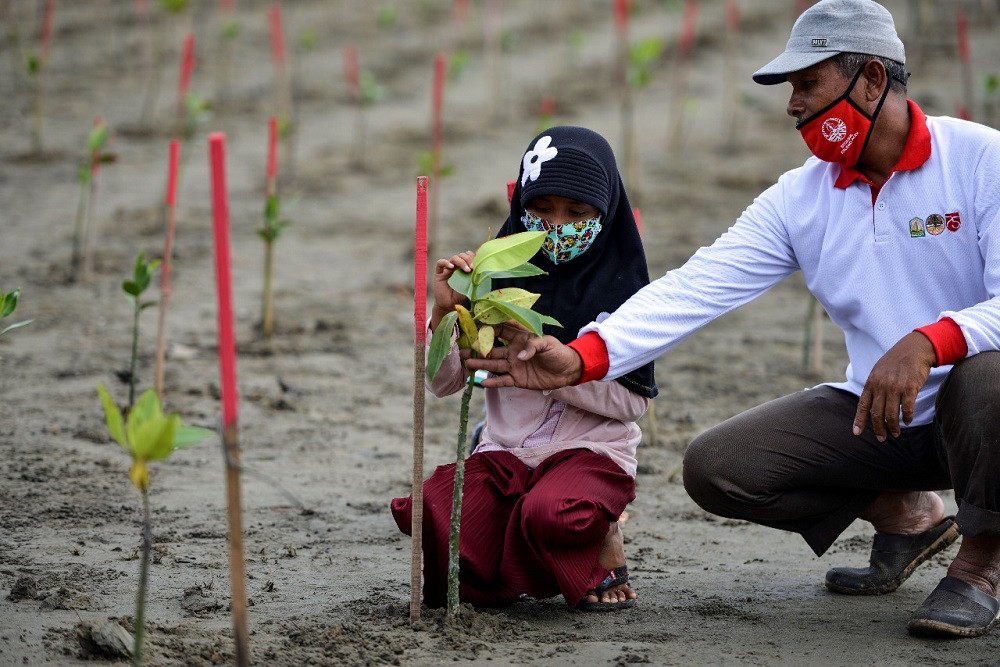Popular Reads
Top Results
Can't find what you're looking for?
View all search resultsPopular Reads
Top Results
Can't find what you're looking for?
View all search resultsIt’s time for nature
The competition among humans to extract natural resources actually shows that the reason and rationality backing the exploitation is the veil of capitalism.
Change text size
Gift Premium Articles
to Anyone
T
he current COVID-19 pandemic has forced us to rethink our relationship with nature. We humans are an integral part of nature and its inherent system. Nature is a space where biotic and abiotic factors interact. Human life will always be affected by the surrounding ecosystem, from the micro-organism to the macro-climate.
We could be destroyed by a biological entity, such as a fast spreading outbreak of disease with sudden impacts and huge casualties, as well as the long-term impacts of climate change. Therefore, it is now the right time to reflect on our approach to nature.
Aug. 10 has been established by the Environment and Forestry Ministry as National Nature Conservation Day. It’s a day when we can reflect back on our efforts to conserve nature in Indonesia.
We are currently in a giant storm of the human journey on earth. For the last 12 months, we have been experiencing a series of very dramatic occurrences. We witnessed a parade of events such as forest and land fires in Australia, America and Indonesia, locust attacks in Africa and India and the most terrifying COVID-19 pandemic.
These events clearly illustrate our interdependence with the earth's web of life. We might arrive at a very existential question: what is the value of human beings on this planet?
As the most intelligent creature on earth and at the top level of the food chain, humans exploit nature and change every trace of the face of the earth. Industrialization and globalization have truly united us as a race for prosperity. However, globalization may also serve as a means of spreading and developing negative biological components (for humans). The COVID-19 pandemic is a real example.
Andrew Nikiforuk in Pandemonium says the invasion of infectious diseases on a global scale is due to three supporting factors: the global economy, population density (especially big cities) and high levels of human mobility.
On the other hand, as the population rapidly grows, the need for resources increases. More land, some of which is ecologically important, is converted. More natural resources, such oil and coal, are extracted to generate power for industries. The problem in many countries is that the financial benefits of conversion and extraction are the leading considered factors. Without proper planning and a lack of environmental considerations, we should not be surprised by the disastrous results.
We are seeing a decrease in consumption of resources during the COVID-19 pandemic due to the reduction in human movements and activities. This is ironically good for nature. However, once the pandemic is over, we might see an escalation in conflict over natural resources in fulfilling land claims for food, energy, housing, mining and industrialization needs.
If we analyze the situation more deeply to figure out the causes, we will see a tight connection between the current pandemic and ecological problems. Ecologically speaking, natural populations are regulated by density-dependent factors. Pressures on a population become stronger as it becomes denser. As the population booms, opportunities for infectious diseases to develop also increase. There have been indications the development of the coronavirus was closely connected to the unhealthy and crowded urban environment and unhealthy practices in wild animal consumption.
The paradigm of development has been very anthropocentric. The benefit for humans is a measure of goodness. The usefulness to the human species is considered the ultimate goal of civilization in the world. Is this ethical?
Max Horkheimer, a Frankfurt School figure, said that we commonly view reason as neutral. However, reasons could seem ethical, but at the same time be an instrument of capitalism. Sometimes ethical values are just an ethical veil, covering desires that are actually unethical. Humans might then use the justification that everything is done on an ethical basis. But, is it?
The history of colonialism and slavery are an example. These two tragedies in human civilization were once said to have an ethical basis. Charles O'Connor, a United States politician who ran for US President in 1872, once said that slavery was justice by its nature and had a philosophical basis. So, it was not only that they were not aware that they committed oppression, O'Connor even called it justice. What an irony!
The exploitation of nature may also be perceived by us to have a strong philosophical basis and reason, which is that it is for the sake of humankind. However, when an ecological disaster occurs, nature is said to be unfriendly. Although we are the ones who damaged it.
The competition among humans to extract natural resources actually shows that the reason and rationality backing the exploitation is the veil of capitalism. Yes, we need welfare and prosperity, but nature needs to be sustainable. Sustainability in the end also benefits humans.
Then, would life on earth be better without humans? The answer might be no. However, existential questions like that must be proposed to provide a wiser assessment of the value of human existence on earth. Therefore, we humans will have a moral foundation to decide the best approach to utilize our planet.
Our sense of consideration of nature must be raised. The foundation of development must be shifted from anthropocentric to ecocentric. Humans are only part of nature, and are not the only ones that must always be prioritized. Therefore, we really need to rethink our approach to nature.
The time of the COVID-19 pandemic may serve as a moment for global contemplation among humans. It is the time for nature.
***
The writer is a tropical ecologist at the University of Bengkulu and adjunct associate professor at University of New England Australia.










